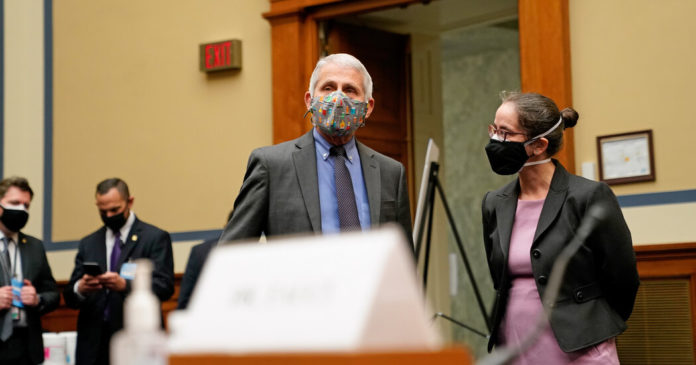Three top federal health officials appeared on Capitol Hill on Thursday and implored Americans to get vaccinated against the coronavirus, but said little about the investigation into whether the Johnson & Johnson vaccine may be linked to a small number of cases of rare blood clots, or when that vaccine might be put back into use.
“Hopefully we’ll get a decision quite soon, as to whether or not we can get back on track with this very effective vaccine,” Dr. Anthony S. Fauci, President Biden’s top medical adviser for the coronavirus, told a House panel.
Dr. Fauci’s comments came as the future of the Johnson & Johnson one-shot vaccine hung in the balance. Earlier this week, the Food and Drug Administration and the Centers for Disease Control and Prevention called for a pause in the use of the vaccine in the wake of reports of a small number of rare blood clots in recipients. Though it is unclear whether the vaccine was responsible for the clots, injections came to a sudden halt across the country.
On Wednesday, a C.D.C. advisory panel suggested that it would be a week to 10 days before they had enough information to assess the vaccine’s risks and could make a decision about its future. In the meantime, the officials — Dr. Fauci; Dr. Rochelle Walensky, the C.D.C. director; and Dr. David Kessler, who runs the Biden administration’s vaccine effort — urged Americans to continue to get vaccinated.
“I hope we can all come together and send that message,” especially amid the spread of worrisome variants, Dr. Kessler said, adding that the three federally authorized vaccines have “an excellent safety profile.”
During a hearing that lasted more than two hours, just one lawmaker — Representative Mark Green, Republican of Tennessee, who is a doctor— asked about the Johnson & Johnson vaccine. He urged the doctors to be careful when they talk about the investigation, saying he worried it would stoke fears that would discourage people from getting vaccinated.
Whatever science was discussed was overshadowed by partisan posturing and bickering. Republicans, fresh off a trip to the nation’s southern border, used the session to attack the Biden administration’s handling of the immigration crisis; they waved photographs of migrants living in crowded conditions, while complaining about testing rules for those entering the country.
Democrats blasted the Trump administration and asked softball questions.
“Dr. Fauci, I love you,” Representative Maxine Waters, Democrat of California, whose sister died of Covid-19, said at one point, after telling Dr. Fauci how much she relied on his counsel.
Dr. Fauci felt little love from Republicans, however. He and Representative Jim Jordan, Republican of Ohio, reprised their heated clash from the last time Dr. Fauci testified before the panel in July 2020.
“You’re ranting again,” Dr. Fauci said at one point.
“I’m not ranting,” Mr. Jordan replied.
“Yes, you are,” Dr. Fauci insisted.
With worrisome new variants of the virus spreading, Dr. Fauci and the others repeatedly described all three of the federally authorized vaccines — from Johnson & Johnson, Pfizer-BioNTech and Moderna — as highly safe and effective.
The reports of blood clots were the second recent blow to the Johnson & Johnson vaccine. Earlier this month, an ingredient mix-up at a Baltimore manufacturing plant owned by Emergent BioSolutions ruined up to 15 million doses of the vaccine. The F.D.A. is now inspecting the plant to see whether any vaccine doses manufactured there can be released to the public.
What You Need to Know About the Johnson & Johnson Vaccine Pause in the U.S.
-
- On April 13, 2021, U.S. health agencies called for an immediate pause in the use of Johnson & Johnson’s single-dose Covid-19 vaccine after six recipients in the United States developed a rare disorder involving blood clots within one to three weeks of vaccination.
- All 50 states, Washington, D.C. and Puerto Rico temporarily halted or recommended providers pause the use of the vaccine. The U.S. military, federally run vaccination sites and a host of private companies, including CVS, Walgreens, Rite Aid, Walmart and Publix, also paused the injections.
- Fewer than one in a million Johnson & Johnson vaccinations are now under investigation. If there is indeed a risk of blood clots from the vaccine — which has yet to be determined — that risk is extremely low. The risk of getting Covid-19 in the United States is far higher.
- The pause could complicate the nation’s vaccination efforts at a time when many states are confronting a surge in new cases and seeking to address vaccine hesitancy.
- Johnson & Johnson has also decided to delay the rollout of its vaccine in Europe amid concerns over rare blood clots, dealing another blow to Europe’s inoculation push. South Africa, devastated by a more contagious virus variant that emerged there, suspended use of the vaccine as well. Australia announced it would not purchase any doses.
About 7.7 million Americans had received the Johnson & Johnson vaccine, accounting for less than 4 percent of the more than 198 million doses administered across the country. The Pfizer and Moderna vaccines are in much greater supply.
Officials note that the blood clots are extremely rare; the handful of cases represent less than one in one million recipients, although that incidence estimate could go up if more cases are reported.
Biden administration officials say that the absence of the Johnson & Johnson vaccine might not have a major impact on the U.S. vaccination campaign. But if use of the vaccine is severely restricted worldwide, it could prove disastrous for the global vaccination effort.
Health officials had hoped that the Johnson & Johnson vaccine, along with a similar vaccine developed by AstraZeneca, would help supply the world because they are less expensive and easier to store and handle than the Pfizer and Moderna vaccines.
But there have also been reports of rare blood clots in recipients of the AstraZeneca vaccine, leading a number of nations to reconsider its use. On Wednesday, Denmark, where two recipients suffered severe blood clots, permanently suspended use of the AstraZeneca vaccine.
Source : Nytimes













